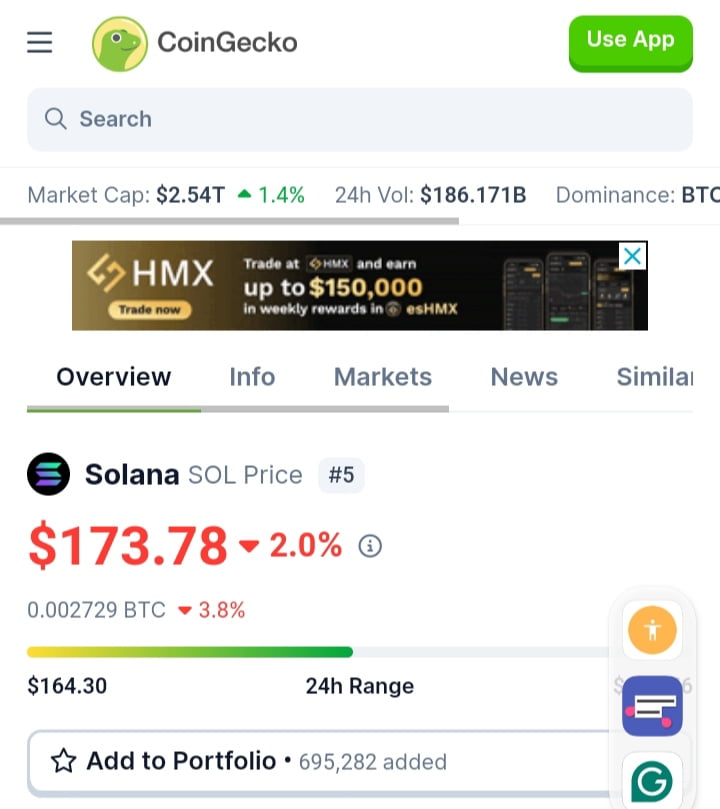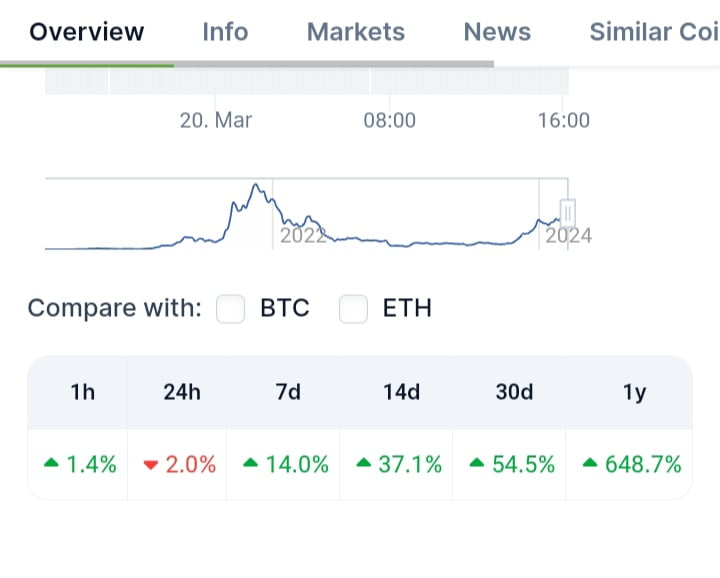Last updated on January 14th, 2025 at 05:33 pm
Solana has been gaining a lot of traction lately due to several meme cultures launching daily, ranging from the cat, woof, and dog cultures.
While Ethereum, on the other hand, has made crypto traders millions of dollars, Solana has done the same.
Thus, Solana and Ethereum are two top blockchains contending with each other; which one is better? Is Solana truly better than Ethereum? That’s the question on everyone’s mind.
In this article, we will explore their key features, scalability, transaction speed, and Solana Vs Ethereum market value. After reading this article, you will find out which is better than the other.
Understanding the Solana blockchain
The Solana blockchain is best known for its high speed and low fee in terms of transactions. It was founded by the Solana Foundation and the Solana Labs in 2017.
Solana Foundation is a nonprofit organization in Switzerland, while Solana Lab is a group of technologists who operate at the center of blockchain infrastructure, crypto, and defi applications.
The Solana blockchain was built as the ethereum killer, which acts similarly to the ethereum blockchain but with improved technology and designs.
You Might want to check out this top 3 best Solana Dexs in 2024
Moreover, Solana and Ethereum utilize different blockchain infrastructure and consensus mechanisms. While Ethereum utilizes the proof of stake, the Solana blockchain utilizes both the proof of stake and proof of history consensus mechanisms, giving it an upper hand over Ethereum in terms of fees and speed.
Understanding the Ethereum blockchain
Ethereum is the father of smart contracts; this term is used because it was the first blockchain technology that brought smart contracts into play. Thus, the Ethereum blockchain was founded and created in 2015 by a public figure in the crypto space, “Vitalik Buterin,” a young and awesome Canadian computer programmer.
Moreover, the Ethereum network is an open-source blockchain, which means anyone can deploy or build on the existing blockchain using its open-source code. Ethereum has a native token called Ether, commonly referred to as ETH, which is used to facilitate transactions on the blockchain network. ETH is also used for gas fees and app interactions.
The Ethereum blockchain network is built with a system that facilitates smart contract creation and Defi application deployment that can’t be controlled by the central authority.
Since there’s clarity about both blockchain networks, let’s check out Solana vs. Ethereum speed.
Solana vs. Ethereum blockchain speed
Solana blockchain is very fast in terms of processing transactions; this is why most people love interacting with it, as it utilizes the proof of stake (PoS) and proof of history (PoH) consensus mechanisms for high transaction throughput.
To further understand this concept, the proof of history (PoH) consensus mechanism allows validators to agree on the other occurrence by giving historical records on transactions on the blockchain.
With this method, it makes it easier to establish an agreement, taking up to 65,000 transactions per second (TPS).
On the other hand, the Ethereum blockchain uses the proof-of-work (PoW) consensus mechanism as bitcoin, but later upgraded to the proof-of-stake (PoS) consensus mechanism due to the fact that the active user base was greater than its capacity. Transaction speeds became very slow while the network was facing congestion.
However, transactions on the Ethereum blockchain are still not that fast, as the team is still working on it to ensure it is capable of processing over 100,000 transactions per second.
Solana vs. Ethereum Consensus Mechanism
To further understand this concept, the consensus mechanism governs how nodes in a blockchain verify transactions in terms of agreement. Solana vs. Ethereum has various consensus mechanisms that govern the blockchain network.
The Solana blockchain employs both the proof-of-stake PoS and the proof-of-history PoH consensus mechanism, as earlier discussed. The proof of history, as the name implies, provides a verifiable and efficient history of events, which allows the validator to easily validate transactions.
While the ethereum blockchain uses the proof-of-stake (PoS) consensus mechanism, this process requires a validator to stake, or rather lock some ETH, to be able to validate transactions on the ethereum blockchain. In the ethereum blockchain, validators are selected to create a new block based on their stake.
Solana vs. Ethereum blockchain scalability

In every blockchain network, scalability is very vital, as this helps in the management of the blockchain network in terms of increasing transactions and performance. When it comes to scalability, Solana wins, as it is designed to handle larger or higher transaction volumes per second, making it faster than Ethereum.
The Solana blockchain is ideal for powerful applications that run at higher transaction volumes, like gaming sites, Defi applications, Dex, and others. Its uniqueness is exceptional, as it combines both the proof of stake and the proof of historical consensus to facilitate the network.
On the other hand, Ethereum had terrible issues when it was running on a proof-of-work (PoW) consensus mechanism. To tackle this issue, the network underwent an upgrade, which was referred to as Ethereum 2.0, on September 15, 2022.
The network moved from the PoW to the PoS consensus mechanism to enhance the scalability issue. To further help the network, layer two blockchain solutions were introduced to improve scalability and maintain the performance of the ethereum blockchain, thanks to Optimistic Rollups, ZK-Rollups, Arbitrum, Immutable X, Mantle, and others.
Solana vs. Ethereum blockchain gas fees
Understanding the concept of a gas fee, take a look at the fees you pay in college just to get access to learning, or rather, the fees you pay when transferring money from your bank to other banks. In the blockchain and cryptocurrency ecosystem, it is referred to as a gas fee.
Gas fees enable the execution of transactions or interactions between applications such as swapping, bridging, minting of NFTs, voting, and to mention a few.
When looking at the comparison of both blockchain networks, Solana and Ethereum, in terms of gas fees, there’s a distinction.
Heres how you can safeguard your Solana crypto against scammers
The Solana blockchain utilizes the proof-of-history consensus for higher transaction throughput and lower transaction fees than the Ethereum blockchain. This is one of the reasons why the Solana blockchain is often called the “ethereum killer.”.
Moreover, Solana is designed uniquely that its pricing scheme delivers predictable and low-cost transactions, which is useful for high-frequency trading that demands frequent contact. To further understand, the Solana fees are based on processing resources and data size rather than gas units, unlike the Ethereum blockchain.
The concept of gas units in the ethereum chain is designed in such a way that each smart contract operation uses a set quantity of gas. This means that gas prices on the ethereum chain differ based on demand and congestion.
When demands are high, meaning there’s a lot of unverified transactions, the gas fee might be very high due to heavy demand. Moreover, the layer two blockchain solution is helping in the scalability of the ethereum chain to reduce demands and congestion.
Is Solana better than Ethereum?
To conclude if Solana is better than Ethereum, it is better to understand the advantages and disadvantages of both if it suits you.
On the other end, Solana might be the best for you if its speed, scalability, and low fees are suitable for you, while Ethereum might be better if you’re likely a developer, as Ethereum provides strong developer support, a stable ecosystem, and compatibility with ethereum-based apps.
Theses Crypto should be in your portfolio before the bull run in 2024
For better decision-making, developers and users should weigh both blockchains based on their ecosystem and infrastructure.
Solana and Ethereum are two top blockchain networks with different features and benefits. Ethereum’s high gas fee is a no-no to some individuals, while on the other hand, it has a large developer community.
Is Solana a good long-term investment?

If Solana is a good investment, has been the question everyone is asking, Due to its uniqueness and potential, there are things to look at before deciding if it is a good investment or not.
The Solana native token is on a journey to challenge the Ethereum native token, as it has been gaining a lot of traction in 2024 after breaking the $50 mark.
Late 2023, the Solana decentralized trading volume surpassed the Ethereum decentralized trading volume. This was due to the fact that meme coins started pushing Solana to raise.
At the time of writing this, Solana is trading at a price range of $170–$174 after breaking $200 a few days ago. In one year timeframe from coingecko, the Solana token has done over 600%.

Everyone taught Solana will never get above $100 after failing from its all-time high of $259 to below $13.
Solana might be a good investment in the long run, as it has a lot of potential, tractions, community, backers, partnerships, collaboration, and so on, to name a few.
In terms of price, Solana is predicted to hit above $800–$1000 by some industrial experts in the crypto space.
Conclusions
Solana and Ethereum blockchains are dominating the blockchain and cryptocurrency ecosystems, while Ethereum might be the king of smart contracts.
Solana is contending to overtake the Ethereum chain with its scalability, high and fast transaction speed, and smooth operation.
Moreover, it is better to understand both blockchain ecosystems to better navigate through and utilize their potential.
With Solana’s high transaction throughput and low fees, will it be able to overtake the Ethereum chain? I’m curious; kindly drop your opinion in the comments section below.

![You are currently viewing Solana Vs Ethereum – Is Solana better than Ethereum? [Key features]](https://cryptopuncher.com/wp-content/uploads/2024/03/pexels-alphatradezone-5789887-scaled.jpg)


